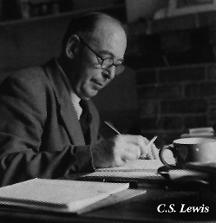
Paradise Retained
Lewis made it clear that Perelandra was his favorite book in the trilogy. This may have been because he was able to present his theological views in a less disguised manner than in Out of the Silent Planet. The themes of temptation and “Paradise Retained” as he put it were central to the story. He managed to include these messages and themes without running the risk of sounding overly preachy due to the rich science fiction and fantasy elements that were present throughout the novel. The depth of the philosophical content and Biblical resemblance are vivid, but because of the dramatic imagery of the story, both secular and Christian readings of Perelandra are possible.
The black and white separation of good and evil present in the first book are both amplified and, at the same time, made more complex by the idea of demonic possession. Weston, as a man, garners a level of sympathy because of his utter helplessness to resist powers beyond his understanding and control. In the midst of his megalomania, Weston even apologizes to Ransom for his bigoted actions on Malacandra. He now sees all forms of intelligent life in the universe are holding equal rights to exist. It is, nevertheless, Weston’s warped sense of religion and morality that seals his fate. This is a much more forgivable offence, in some senses, because he is in the same situation as millions of people who struggle on a daily basis with their own religious interpretations. In the end, Ransom’s true nemesis is not Weston, but the dark consciousness that invades his body.
Ransom’s inability to defeat the Un-Man in logical argument leads to his decision to destroy him physically. This is a rather unorthodox method of theological argumentation, but one that is a result of last resort. The process even leaves Ransom questioning his own motives, as he begins to feel what he calls a “pure hatred” of the creature he is fighting. His eventual success, however, has the desired effect, ridding the virgin world of its tempter and giving Perelandra the paradise that the Garden of Eden failed to become.
During his sojourn in Perelandra, Ransom discovers through his attempts to warn the innocent Green Lady of evil, that Original Evil is simply the absence of good. It is the tendency to cling to good things that are desired rather than accept good things given by Maleldil. This becomes his frame of reference when talking of evil for the rest of the novel. This realization, along with his eye-opening conversation with the two great Oyarsu Eldila near the end of the story, elevates Ransom’s spirituality to a new level, and prepares him for his return to Thulcandra, the Silent Planet.
